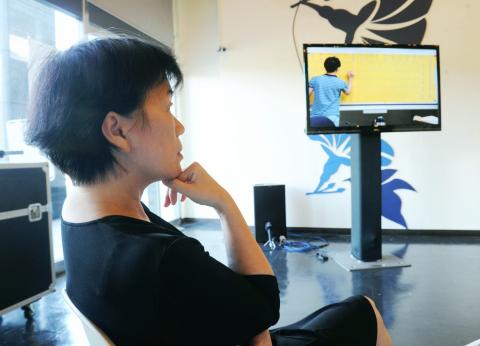The review meeting to approve the Public Television Service’s (PTS) fifth board of directors failed once again yesterday, with Minister of Culture Lung Ying-tai (龍應台) saying the result was “sorrowful” and demonstrated that requiring three-fourths of the review committee to approve a prospective board member was an unreasonably high threshold.
Lung said the ministry had done its best to push through amendments to the Public Television Act (公共電視法), including lowering the approval threshold from three-fourths to one-half.
Only three board members and two supervisors were approved at yesterday’s review meeting, the third of its kind so far.

Photo: CNA
The three new board members are Chen Hsin-hung (陳信宏) — commonly known as Ashin (阿信), the lead singer of pop-rock band Mayday — PC Home chairman Jan Hung-tze (詹宏志) and Pegatron Corp chairman Tung Tsu-hsien (童子賢).
The two supervisors that were approved are Chou Ling-tai (周玲臺), a professor at National Chengchi University’s Department of Accounting, and Ku Ling-ling (谷玲玲), a professor at the Graduate School of Journalism at National Taiwan University.
Lung said the ministry would not be able to recommend a new nominee list in the near future.
Five board members and one supervisor were approved one-and-a-half years ago, but approving only three board members and two supervisors from a list of 14 board nominees and four supervisor nominees means that PTS’s fifth board of directors still cannot be established, Lung said.
“I feel very sorry and sorrowful [about the situation],” she said.
Lung said the reason she felt sorry because PTS “is a television broadcaster that belongs to all citizens and taxpayers, but civil society is being made to tolerate a law [referring to the Public Television Act (公共電視法)] that allows a few people to paralyze the implementation of a public service.”
By contrast, the approval threshold for Council of Grand Justice members is only 50 percent, so it is unreasonable that the unpaid board of directors for the PTS needs a higher approval threshold of three-fourths, Lung said, adding that if the act is not amended, the result of the next review meeting would probably be similarly disappointing.

Eight restaurants in Taiwan yesterday secured a one-star rating from the Michelin Guide Taiwan for the first time, while three one-star restaurants from last year’s edition were promoted to two stars. Forty-three restaurants were awarded one star this year, including 34 in Taipei, five in Taichung and four in Kaohsiung. Hosu (好嶼), Chuan Ya (川雅), Sushi Kajin (鮨嘉仁), aMaze (心宴), La Vie by Thomas Buhner, Yuan Yi (元一) and Frassi in Taipei and Front House (方蒔) in Kaohsiung received a one-star rating for the first time. Hosu is known for innovative Taiwanese dishes, while Chuan Ya serves Sichuan cuisine and aMaze specializes

Taitung County is to launch charter flights to Malaysia at the end of this year, after setting up flights to Vietnam and Thailand, the Taitung County Government said yesterday. The new charter flight services, provided by low-cost carrier Batik Air Malaysia, would be part of five-day tour packages for visits to Taitung County or Malaysia. The Batik Air charter flight, with about 200 seats, would take Malaysian tourists to Taitung on Dec. 30 and then at 12:35pm return to Kuala Lumpur with Taiwanese tourists. Another charter flight would bring the Taiwanese home on Jan. 3 next year, arriving at 5:30pm, before taking the

Taiwan High Speed Rail Corp. (THSRC) plans to ease strained capacity during peak hours by introducing new fare rules restricting passengers traveling without reserved seats in 2026, company Chairman Shih Che (史哲) said Wednesday. THSRC needs to tackle its capacity issue because there have been several occasions where passengers holding tickets with reserved seats did not make it onto their train in stations packed with individuals traveling without a reserved seat, Shih told reporters in a joint interview in Taipei. Non-reserved seats allow travelers maximum flexibility, but it has led to issues relating to quality of service and safety concerns, especially during

An exhibition celebrating Taiwan and Japan’s comic culture opened on Saturday in Taichung, featuring a section that explores Taiwanese reproductions of Japanese comics from when martial law limited Japanese representation. “A Century of Manga Culture: An Encounter of Taiwan and Japan’s Youth” held its Taiwan opening ceremony at Taichung’s National Taiwan Museum of Comics after an initial one-month run in Japan’s Kyoto International Manga Museum between May 24 and June 24. Much like the Kyoto exhibition, the show mainly celebrates the comic connection between Taiwan and Japan through late Taiwanese comic book